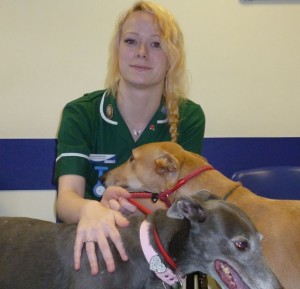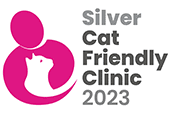 During the month of May it is Veterinary Nurse Awareness month and it’s to help create awareness of the importance of the veterinary nursing profession and the provision of responsible pet care.
During the month of May it is Veterinary Nurse Awareness month and it’s to help create awareness of the importance of the veterinary nursing profession and the provision of responsible pet care.
One of our nurses, Danielle Barnett, has written a blog about the duties a Veterinary Nurse undertakes. We hope you find it useful and we would like to thank Danielle for taking the time to write this.
Veterinary Nurses can train in a variety of ways to gain their qualification. Some may study for a Degree at university lasting three to four years and some may study for a Diploma usually lasting around two years but based in a veterinary practice. Both of these entitle the qualified nurse to enter the RCVS register and become a registered Veterinary Nurse (RVN).
Here at Cherrydown Vets Ltd we employ three types of clinical nursing staff: RVN’s who wear a green uniform, Student Veterinary Nurses (SVN’s) who wear a green and white striped uniform and Auxiliary Nurses who wear a blue uniform similar to the reception staff.
There are four main areas to a VN’s job; clinics, theatre/ lab, kennels and emergency out of hours/ weekends. Each area has a different set of skills required and needs time for a VN to do his/ her job well. Below are four descriptions of a typical day in each shift.
Clinics:
We have quite a few specific clinics including weight, rabbit, travel, diabetes and senior pets. Each category is run by one or two nurses who have specific knowledge in that area. These are run during nurse clinic hours alongside our standard clinics which are post op checks, nails clips, anal glands, blood tests, diet advice, dressing changes, worming advice and many more. Clinics can get really busy as we also have a walk in service for nurse appointments Monday to Friday. The clinic nurse needs to liaise with the vets about any cases which have been seen as a nurse clinic but need veterinary treatment or have developed medical issues additional to what it was originally booked in for. Completing an estimate for any patients admitted to hospital during the day for treatment needs to be done as soon as possible so that treatment can be started. Phone calls also take up a large chunk on the clinic nurses day. These calls are usually courtesy call to owners of patients from the day before and to people wishing to know about procedures for their animals or general advice.
Any emergencies which come through the door will first be triaged by the clinic nurse. This means that the clinic nurse will have to stop whatever he/ she is doing to assess if the emergency is immediately life threatening and administer first aid if needed then alert the nearest vet.
Theatre/ Lab:
The first job of the day is to set up the operating theatres making sure all surgical kits are sterile, check all anaesthetic machines and breathing circuits are working correctly and turn on the x-ray machine and processor. The Lab nurse will then assist the night staff with any difficult patients and take temperatures from animals in hospital. When animals are admitted for procedures the theatre nurses will ensure all animals are vet checked and any pre-operative blood samples are taken and given to the in house lab. Blood samples to be run in house are prioritised over those to be sent away as our courier for the external lab comes in the evening. All blood samples taken from nurse clinics and histological samples are prepared to be sent away for testing if needed (paperwork completed, blood smears made) and put in the fridge.
Theatre nurses will calculate and draw up medications for the days operations and administer premeds as directed by the vet. As theatre nurses we will help the vet to sedate animals or induce and place breathing tubes then monitor the sedation/ anaesthetic. We will also clip the area to be operated on and clean the skin with a surgical scrub solution. Sometimes it is necessary to notify owners via a phone call of any extras that may need doing and gain consent to do them such as removing deciduous teeth or dispensing any extra medication. The nursing team will move animals under anaesthetic to the operating theatre safely, monitor the animal throughout the anaesthetic and record critical values. Hands on assistance is occasionally required and nurses ‘scrub in’ to help the vet. When the animals are recovered from surgery they are monitored closely as this is the most risky part of the anaesthetic. Any problems are flagged up to the nearest vet. It is the responsibility of the nurse who assisted the surgery to price the procedure and consumables. Once awake the patients are passed back over to the kennel nurse. Any x-rays which need doing are taken by the theatre nurse with the case vet attending. All theatre staff are required to clean the prep area and theatres after the days operations are complete.
See part 2 of this blog for more information about the Veterinary Nurse role
If you have any questions regarding this blog either call us at the clinic and speak to a nurse or post your question on our Facebook page





